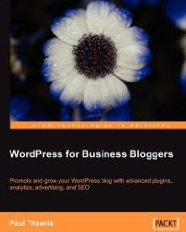After more than a year-long hiatus, this entry marks my return to blogging. One of the things I decided to do to get myself back into the spirit of blogging was to change my blogging engine. I made the move from the .NET-based DasBlog to the more mainstream WordPress platform. I will be providing more information about the migration process (specifically, WordPress on IIS 7), helpful tools and tutorials, and useful WordPress plugins in an upcoming blog post.

Knowing very little about how WordPress worked beforehand, I needed a book to jumpstart my involvement with the tool. After a bit of research, I settled on WordPress for Business Bloggers. This book, along with some basic Web-based tutorials on installing WordPress on IIS were all I needed to get myself up to speed. My detailed Amazon.com review of the book can be found below.
Touted as a ‘beyond the basics’ book targeted towards business bloggers, WordPress for Business Bloggers delivers a wealth of WordPress and blogging knowledge in the context of a fictitious case study. I picked up this book as a way to jumpstart my involvement with WordPress after several years of involvement with other blogging tools. I was not at all disappointed with the results.
Based upon my experiences, I can confidently assert that no experience with WordPress is necessary to benefit from this book. The book states the assumption of such knowledge up front and, after that, never returns to WordPress basics. Ample materials on WordPress installation, operations and configuration can be found online and I appreciate that the book didn’t spend any time rehashing these items.
Instead of focusing on simpler procedural activities, the book weaves together the challenges of solving business issues for Chiliguru, a fictitious business blog, with advanced WordPress operations, guidance, and plugins. The book manages to bridge the challenges of running a day-to-day blog with WordPress-specific knowledge in a unique style. One would be hard pressed to cobble together the information and knowledge this book imparts from the web-based tutorials currently available on the Internet. Examples of the unique content covered in this book include:
- Search engine optimization, including coverage of keywords, permalinks, and sitemaps supported by a variety of WordPress plugins
- Integrating social networking content from Twitter and Facebook into WordPress blogs
- Blog statistics analysis with both WordPress stats and Google Analytics
- Integration of Google AdSense and Amazon Affiliate programs into WordPress-based blogs
- Coverage of advanced technical topics including: increasing scalability via WP Super Cache, using WordPress MU for multi-blog environments, and backing-up, restoring and moving WordPress blogs.
If you’re looking for a beginners guide to WordPress, this book is not for you. On the other hand, if you’ve accumulated some basic experience with WordPress or another blogging engine and you’re looking for insight and knowledge to take your WordPress blog to the next level, you really can’t go wrong with this book.